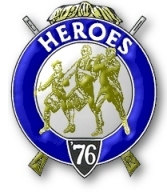
Heroes `76

William Prescott
Born: February 20 1726 in Groton, Massachusetts
Died: October 13 1795 in Pepperell, Massachusetts
"Don't fire until you see the whites of their eyes!" This legendary order has come to symbolize the conviction and determination of the ill-equipped American colonists facing powerful British forces during the famous battle fought on this site on June 17, 1775. The battle is popularly known as "The Battle of Bunker Hill" although most of the fighting actually took place on Breed's Hill.
The Battle of Bunker Hill pitted a newly-formed and inexperienced colonial army against the more highly trained and better-equipped British. Despite the colonial army's shortcomings, it was led by such capable men as Colonel William Prescott, Colonel John Stark and General Israel Putnam, who had experience fighting alongside the British in the French and Indian War. Although the British Army ultimately prevailed in the battle, the colonists greatly surprised the British by repelling two major assaults and inflicting great casualties. Out of the 2,200 British ground forces and artillery engaged at the battle, almost half (1,034) were counted afterwards as casualties (both killed and wounded). The colonists lost between 400 and 600 combined casualties, including popular patriot leader and newly-elected Major-General Dr. Joseph Warren, who was killed during the third and final assault.
William Prescott, soldier, born in Groton, Massachusetts, 20 February, 1726 died in Pepperell, Massachusetts, 13 October, 1795. His father, Judge Benjamin Prescott, was the grandson of John, of Lincolnshire, England, an early settler of Lancaster, Massachusetts The son inherited a large estate and resided at Pepperell. In 1755 he served successively as lieutenant and captain in the provincial army under General John Winslow during the expedition against Nova. Scotia. His conduct in that campaign attracted the attention of the British general, who offered him a commission in the regular army, which he declined, and after the war he retired to his estate at Pepperell.
In 1774 he was appointed to command a regiment of minutemen, with which he marched, on 19 April, 1775, to Lexington, to oppose the expedition that was sent out by General Thomas Gage. Before Prescott arrived the British had retreated, and he then proceeded to Cambridge, where he entered the provincial army, the majority of his officers and men volunteering to serve with him during his first campaign. On 16 June, 1775, he was ordered to Charlestown with 1,000 men, and directed to throw up works on Bunker Hill. On arriving at the ground, it was perceived that the neighboring elevation, called Breed's Hill, was a more suitable station, and on it the defenses, consisting of a redoubt and breastwork, were erected during the night. The following day a large British force commanded by General William Howe attacked the Americans, and, after the latter had repelled two assaults, and had exhausted their ammunition, succeeded in dislodging them. In this battle, which owes its importance to the fact that it demonstrated the ability of the provincials successfully to oppose British regulars, Bancroft says that "no one appeared to have any command but Colonel Prescott," and that "his bravery could never be enough acknowledged and applauded." He was one of the last to leave the entrenchments when lie found it necessary to order a retreat, and immediately offered to retake the position if the commander-in-chief would give him three regiments.
Before the attack Gage, reconnoitering the works, saw Prescott walking on tile parapet, and asked Counselor Willard who he was, and if he would fight? The latter replied, "That is Colonel Prescott--he is an old soldier, and will fight as long as a drop of blood remains in his veins."
Early in 1777 he resigned and returned home, but in autumn of that year he joined the northern army under General Horatio Gates as a volunteer, and was present at Saratoga. After this battle he returned home and sat in the legislature of Massachusetts for several years. He wrote "A Letter from a Veteran to the Officers of the Army en-camped at Boston" (Boston, 1774).